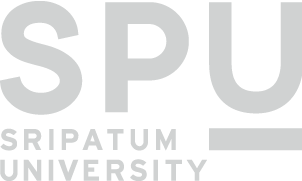Sripatum University (SPU) is intensifying efforts to reduce food waste through a holistic management system that tackles waste from the source and reuses it sustainably. With initiatives like food waste reduction campaigns, composting programs, and partnerships with local suppliers, SPU actively addresses SDG 2 (Zero Hunger) by reducing food loss and SDG 12 (Responsible Consumption and Production) by promoting sustainable waste management. These efforts also align with SDG 11 (Sustainable Cities and Communities) by fostering a greener, waste-conscious campus community.
SPU’s food waste management program is structured to impact various aspects of sustainability. With approximately 800 liters of food waste generated daily across its two primary canteens, SPU recognized an urgent need for responsible waste management practices. The university educates students, faculty, and staff on reducing waste at the point of consumption, encouraging them to order only what is needed and finish their meals. The university further reinforces waste minimization by collaborating with cafeteria suppliers to limit food waste during sourcing and meal preparation. This holistic approach not only reduces the volume of waste but also prevents unnecessary food loss, directly contributing to SDG 2’s goal of minimizing food waste, which supports food security and reduces pressure on food supply chains.
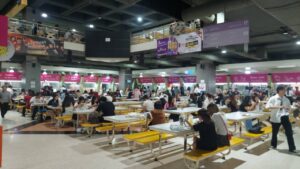
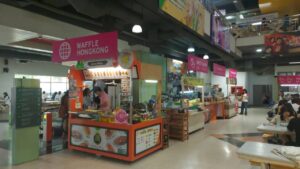

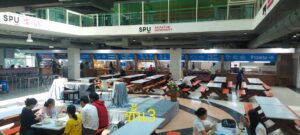
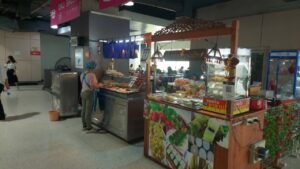
In line with SDG 12, SPU’s composting initiative turns organic waste into valuable compost, which is then used to nourish green spaces on campus. This recycling process lessens the university’s dependency on artificial fertilizers and minimizes greenhouse gas emissions from landfill waste decomposition. SPU’s strategies in waste management also connect to SDG 11, which emphasizes sustainable community practices and green urban spaces. By creating a green campus environment and reducing environmental impacts, SPU contributes to building a more sustainable city model and a cleaner atmosphere within its university setting.
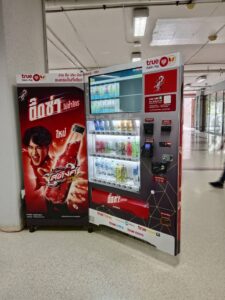

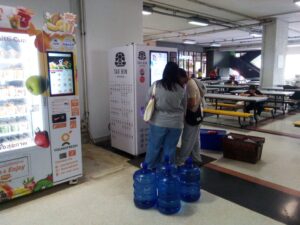
Additionally, these efforts indirectly support SDG 2 by emphasizing the reduction of food waste, which contributes to broader food security goals by minimizing unnecessary food loss. The initiatives also contribute to lowering greenhouse gas emissions from food decomposition, thus fostering a healthier environment for all.
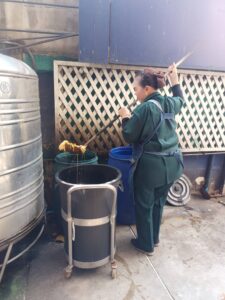
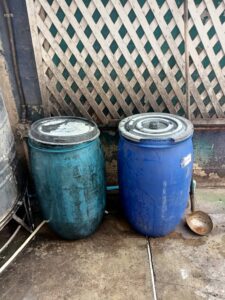
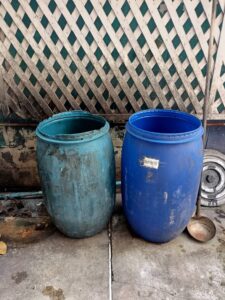
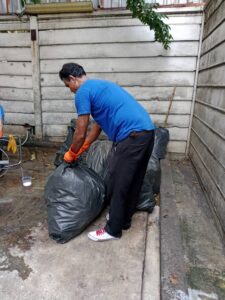
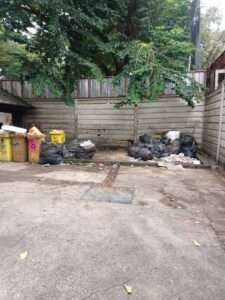

Conclusion:
Through these dynamic efforts, SPU is setting a strong example in sustainability, impacting SDGs 2, 12, and 11 by reducing food waste, recycling resources, and educating its community on responsible consumption. These efforts not only help SPU’s campus become greener but also foster a sustainability-focused mindset among its students, empowering them as advocates for sustainable development within and beyond the university.
Related Documents :
- Food waste management report, from SPU Canteens : 2.3.3 รายงานข้อมูลร้านอาหารภายในมหาวิทยาลัยศรีปทุม
- Food waste report : 2.2.1 (2.2.1) รายงานปริมาณขยะอาหารภายในมหาวิทยาลัยศรีปทุ
- Food waste management report : 2.2.2 ข้อมูลสัดส่วนปริมาณขยะอาหารภายในมหาวิทยาลัยศรีปทุม
- SPU Appointment on Recycling Committee : คำสั่งแต่งตั้ง
- SPU Recycling Initiatives Document : proposal ธนาคารขยะ
มหาวิทยาลัยศรีปทุมขับเคลื่อนแนวทางใหม่ในการจัดการขยะอาหาร สร้างผลกระทบเชิงบวกใน SDGs 2, 12 และ 11
มหาวิทยาลัยศรีปทุม (SPU) เพิ่มความเข้มข้นในการลดขยะอาหารผ่านระบบการจัดการเชิงองค์รวมที่เน้นการลดขยะตั้งแต่ต้นทางและการนำกลับมาใช้ในรูปแบบที่ยั่งยืน ด้วยโครงการรณรงค์การลดขยะอาหาร การหมักปุ๋ยจากขยะอาหาร และความร่วมมือกับซัพพลายเออร์ในท้องถิ่น SPU ไม่เพียงสนับสนุน SDG 2 (ขจัดความหิวโหย) โดยการลดการสูญเสียอาหาร แต่ยังส่งเสริม SDG 12 (การบริโภคและการผลิตที่ยั่งยืน) ผ่านการจัดการขยะอย่างยั่งยืน ความพยายามเหล่านี้ยังสอดคล้องกับ SDG 11 (เมืองและชุมชนที่ยั่งยืน) โดยส่งเสริมชุมชนมหาวิทยาลัยที่เป็นมิตรต่อสิ่งแวดล้อม
โครงการจัดการขยะอาหารของ SPU ได้รับการออกแบบให้ส่งผลกระทบต่อหลากหลายแง่มุมของความยั่งยืน โดยมีปริมาณขยะอาหารที่เกิดขึ้นทุกวันประมาณ 800 ลิตรจากโรงอาหารหลักสองแห่ง SPU ได้ตระหนักถึงความจำเป็นเร่งด่วนในการใช้วิธีการจัดการขยะที่รับผิดชอบ มหาวิทยาลัยให้ความรู้แก่นักศึกษา คณาจารย์ และบุคลากรในการลดปริมาณขยะที่จุดบริโภค โดยกระตุ้นให้สั่งอาหารตามปริมาณที่ต้องการและรับประทานอาหารให้หมด นอกจากนี้ SPU ยังเสริมสร้างแนวทางการลดขยะร่วมกับซัพพลายเออร์ในโรงอาหารเพื่อลดการสูญเสียอาหารในกระบวนการจัดหาและการเตรียมอาหาร ซึ่งการดำเนินงานแบบองค์รวมนี้ไม่เพียงช่วยลดปริมาณขยะ แต่ยังช่วยป้องกันการสูญเสียอาหารที่ไม่จำเป็น ซึ่งส่งผลโดยตรงต่อเป้าหมาย SDG 2 ในการลดขยะอาหารซึ่งช่วยสนับสนุนความมั่นคงทางอาหารและลดความกดดันต่อห่วงโซ่อุปทานอาหาร
ในขณะที่ SPU ดำเนินการตาม SDG 12 การริเริ่มการหมักปุ๋ยจากขยะอาหารทำให้ขยะอินทรีย์กลายเป็นปุ๋ยที่มีคุณค่า ซึ่งสามารถนำไปบำรุงพื้นที่สีเขียวในมหาวิทยาลัยได้ กระบวนการรีไซเคิลนี้ช่วยลดการพึ่งพาปุ๋ยเคมีและลดการปล่อยก๊าซเรือนกระจกที่เกิดจากการย่อยสลายขยะในหลุมฝังกลบ กลยุทธ์การจัดการขยะของ SPU ยังเชื่อมโยงกับ SDG 11 ที่เน้นการปฏิบัติของชุมชนที่ยั่งยืนและการสร้างพื้นที่สีเขียวในเมือง โดยการสร้างสภาพแวดล้อมในมหาวิทยาลัยที่เป็นมิตรต่อสิ่งแวดล้อมและลดผลกระทบต่อสิ่งแวดล้อม SPU จึงมีส่วนร่วมในการสร้างต้นแบบของเมืองที่ยั่งยืนและบรรยากาศที่สะอาดขึ้นภายในชุมชนมหาวิทยาลัย


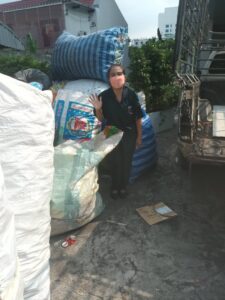
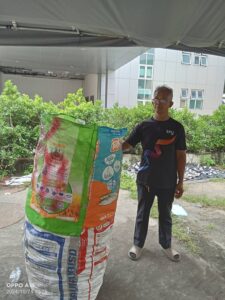

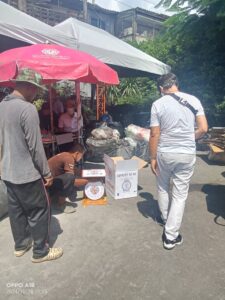
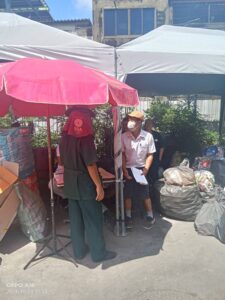
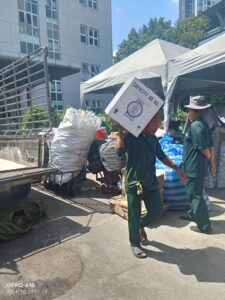
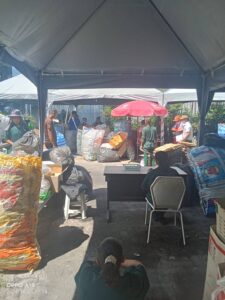

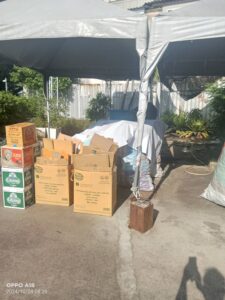

สรุป:
ด้วยความพยายามอย่างเป็นรูปธรรมเหล่านี้ SPU ได้สร้างตัวอย่างที่แข็งแกร่งในด้านความยั่งยืนโดยมีผลกระทบต่อ SDGs 2, 12 และ 11 ผ่านการลดขยะอาหาร การรีไซเคิลทรัพยากร และการให้ความรู้แก่ชุมชนในมหาวิทยาลัยเกี่ยวกับการบริโภคอย่างมีความรับผิดชอบ ความพยายามเหล่านี้ไม่เพียงช่วยให้พื้นที่มหาวิทยาลัยเป็นสีเขียวมากขึ้น แต่ยังส่งเสริมการสร้างจิตสำนึกด้านความยั่งยืนในหมู่นักศึกษา โดยสร้างพวกเขาให้เป็นผู้สนับสนุนการพัฒนาที่ยั่งยืนทั้งในและนอกมหาวิทยาลัย


